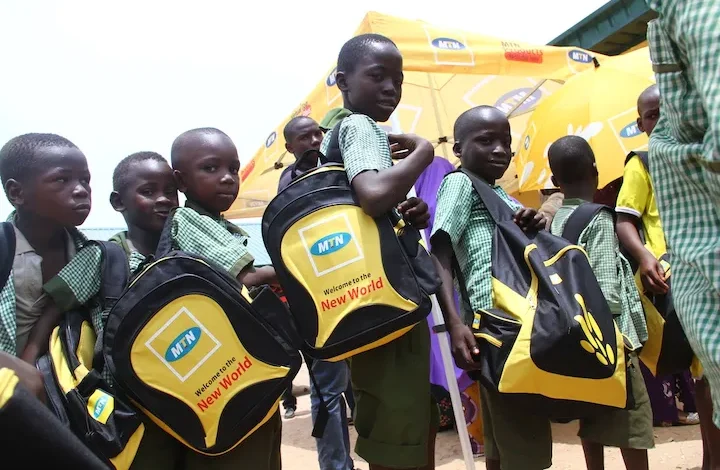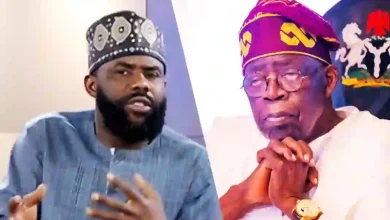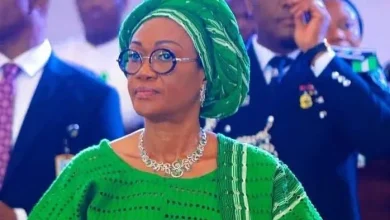Tablets, Hope, and the Future: FCTA-MTN Partnership Powers Abuja’s Digital Education Revolution

NICHOLAS UWERUNONYE writes that as Nigeria struggles with human capital development, a new wave of digital transformation driven by strategic partnerships is changing how pupils study, imagine, and invent. It all started with a quiet revolution in Abuja’s public schools.
In a nation where policy promises and practical realities frequently conflict with regard to education, a silent but significant event took place in Abuja last Friday.
600 digital tablets were formally given to 12 public secondary schools in the Federal Capital Territory (FCT) as part of a major initiative by the FCTA and telecom behemoth MTN Nigeria to reimagine the future of public education.
Dr. Mariya Mahmoud, the FCT Minister of State, who was represented at the ceremony by Michael Bawa, her Special Assistant on Technical Matters, called the initiative “more than just a donation.”
She stated that these tablets are an investment in the development of our country, our children, and digital inclusion.
The immediate buzz of transferring gadgets is only one aspect of the importance of such a collaboration. It strikes at the core of Nigeria’s problems with human development: a weak educational system, restricted access to contemporary resources, and a widening digital divide.
Despite being the capital of the country, Abuja’s public schools have long functioned in an environment that is disconnected from the technology innovations that characterize education in the twenty-first century.
MTN Nigeria is making this donation as part of a larger national initiative.
As part of its corporate social responsibility (CSR) efforts to support digital education and create classrooms that are prepared for the future, the telecom company has announced that it will be delivering 4,600 tablets to public schools in Nigeria.
In the rapidly evolving digital age, Ernest Ndukwe, Chairman of the Board of MTN Nigeria, clarified that the action is about “supporting access to digital learning” and establishing an environment in which no student is left behind.
The advantages are as symbolic as they are useful to the FCT. Students will learn about digital research, interactive learning, and customized study habits that are prevalent in higher education systems worldwide thanks to the devices.
They will, however, bring about a mentality change that goes beyond technology: from reliance on textbooks to multimedia learning, from teacher-centered models to student-driven discovery, and from rote memorization to critical thinking.
The excitement was expertly captured by Kolawole Olabashola, Director of the Department of Science and Technology in the FCT Education Secretariat, who was speaking on behalf of Mandate Secretary Danlami Hayyo.
He declared, “This initiative will position our schools to compete globally.” “It opens new horizons for students in public education and helps bridge the digital divide.”
Not only are these “new horizons” poetic, but they are also essential. More than 60% of children in a country of more than 200 million people are estimated by the World Bank to be in “learning poverty,” which is defined as not being able to read and comprehend a simple text by the age of ten.
Read Also: From Founders to Forgotten: Economic Loss and Political Silence for Abuja’s Indigenous People
Due in large part to low educational attainment, restricted access to healthcare, and slow economic participation, Nigeria continues to have one of the lowest Human Development Indexes (HDI) in the world.
If digital learning is widely used, it presents a unique chance to reverse this dire trend. According to experts, the public school system might see a 30% improvement in test scores and a 20% increase in retention rates if it used digital technologies, such as content-rich platforms, teacher training, and internet access.
Students that are digitally literate are also more equipped for a global labor market that is favoring tech-savvy workers over those with more conventional skill sets.
There are expenses associated with this change, though. The estimated cost of providing digital tablets, e-learning materials, and dependable infrastructure to just 50% of Nigeria’s public secondary schools is ₦300 billion.
If teacher training and digital lab upkeep are added, the total might come close to ₦500 billion over five years.
The return on investment is significant, even though such a figure may cause some people to wonder.
Rwanda, Kenya, Estonia, and other nations that have implemented national digital education frameworks have claimed quantifiable improvements in employment, civic involvement, literacy, and innovation.
In Nigeria, each kobo invested is not only an expense but also a contribution to the country’s peace, prosperity, and production.
For this reason, the FCTA-MTN relationship is an important case study. For the future generation, it provides a model for how the public and private sectors might work together to produce value.
It also communicates to other business players that education is a shared goal rather than merely a government duty.
The program also aligns well with President Bola Ahmed Tinubu’s Renewed Hope Agenda, which emphasizes youth empowerment, digital inclusion, and education reform as key pillars of national growth.
These kinds of initiatives, if carried out regularly, have the power to inspire communities, improve schools, and transform today’s underprivileged youngsters into tomorrow’s leaders, innovators, and creators.
The 600 tablets have more than just CPUs and images as they start their trip into Abuja classrooms; they also hold potential. A pledge to ensure all children, irrespective of their financial status, have the opportunity to learn, compete, and prosper in the digital era.
a pledge that long-ignored public schools can blossom into centers of creativity and quality. Above all, it is a pledge that Nigerian education can achieve its goals and not merely dream about them.
And if that future starts with a single student in Abuja using a tablet screen to realize their full potential, then every cent will matter.





